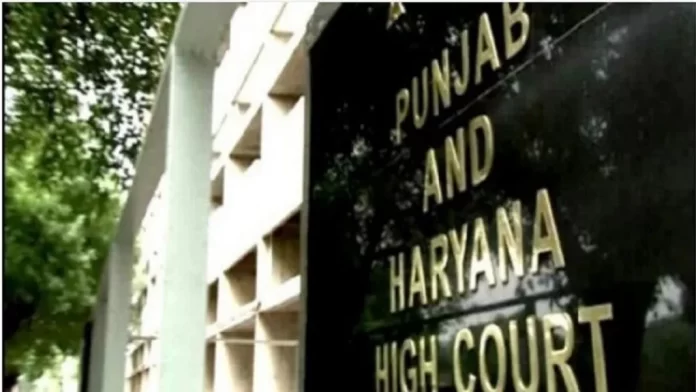The Punjab & Haryana High Court while allowing a petition observed that the employee cannot approach the Labour Court under the Section 33-C(2) of the Industrial Disputes Act, 1947, in absence of already determined liability of the employer to pay the retrenchment compensation.
A Single Bench of Justice Jagmohan Bansal passed this order while hearing a petition filed by Haryana State Minor Irrigation & Tube Wells Corporation Ltd & Another.
The petitioner through the petition under Articles 226/227 of the Constitution of India is seeking setting aside of order dated 29.01.2013 whereby the Labour Court has allowed application filed by respondent under Section 33-C(2) of Industrial Disputes Act, 1947 (ID Act).
The respondent No 2 joined petitioner-Corporation as Junior Engineer in the year 1982. The petitioner-Corporation came to be closed w.e.f 30.06.2002. The closure was effected after seeking permission from Appropriate Government in terms of Section 25O of I.D Act. The petitioner paid retrenchment compensation to all the workers and respondent herein was paid 3 months salary considering him an employee instead of workman. The petitioner was of the opinion that respondent does not fall within the definition of workman as defined under Section 2(s) of I.D Act.
The workman preferred an application under Section 33- C(2) of I.D Act before the Labour Court seeking direction to Management to pay him compensation in terms of Section 25F read with 25N of I.D Act. The Labour Court by the order dated 29.01.2013 has directed the petitioner-Management to pay a sum of Rs 83,360/- alongwith interest @ 8% per annum as retrenchment compensation.
Pritam Singh Saini, and Sanchi Bindra, Advocates for the petitioner submitted that the Labour Court had no jurisdiction to adjudicate disputed questions while exercising power under Section 33-C(2) of I.D. Act. Section 33-C of I.D. Act is a sort of execution provision and under Sub-section (2), the Labour Court can interfere if entitlement is already determined. The petitioner was claiming that respondent does not fall within the definition of workman whereas respondent was claiming otherwise.
Raj Kaushik, Advocate for respondent No 2-Workman submitted that the Labour Court has rightly exercised its jurisdiction and if this Court comes to a conclusion that Labour Court had no jurisdiction, the respondent may be granted liberty to avail any other remedy as permissible by law.
The Court observed that,
From the Supreme Court judgments and reading of Section 33C(2) of ID Act, it is clear that there should be prior confirmed liability of the employer to invoke jurisdiction of the Labour Court under the said section. The said liability may arise on account of award/judgment passed by court or on account of an instrument executed between the parties. In the absence of already determined liability, the employee cannot approach the Labour Court under the said sub-section.
In the case in hand, the respondent was appointed as Junior Engineer. He was retrenched along with other employees on account of closure of the Unit. He was paid 3 months’ salary in terms of Service Bye- Laws, 1980 of petitioner-Corporation. The petitioner is claiming that respondent was not workman and respondent is claiming that he was workman in terms of Section 2(s) of I.D Act. It was a disputed question whether the respondent was a workman or not. The question could not be adjudicated by the Labour Court while exercising power conferred under Section 33-C(2) of I.D Act. From the arguments of both sides, it is difficult to conclude that there was no dispute between the parties or Management had raised a frivolous or vexatious issue to deny the claim of the respondent.
“The Labour Court in exercise of power under Section 33- C(2) of ID Act cannot determine entitlement of retrenchment compensation. It can order the employer to pay already determined compensation. Had any other Court already decided the question of entitlement or petitioner, at any stage, accepted to pay at par with other workers, the Labour Court could proceed to exercise power under Section 33-C(2) of ID Act.
The Labour Court has adjudicated disputed questions and thereafter ordered the respondent to pay to respondent at par with other workers. Section 33-C(2) of ID Act is sort of execution provision and in the absence of already adjudicated/determined entitlement to retrenchment compensation, the Labour Court could not ask the petitioner to pay retrenchment compensation like other workers. Compassion, sympathy or allegation of violation of any vested or fundamental right cannot vest jurisdiction in Labour Court or Tribunal. The Labour Court is a creature of ID Act, thus, it cannot travel beyond or contrary to provisions or limits of ID Act. It has no inherent power though it carries ancillary powers which are necessary to exercise powers vested in it.
In the wake of above discussion and findings, the Court is of the considered opinion that impugned order(s) deserve to be set aside”, the Court further observed while allowing the petitions.


